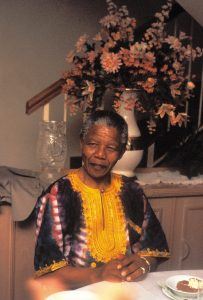Howard W. French at the NYRB:

The cursory familiarity that many people today have with Mandela’s story of moral courage and triumph has produced a near-universal secular beatification. Mandela enjoys an image akin to that of Martin Luther King Jr. The late South African has, in other words, become an easy-to-claim hero. And in keeping with the often invoked King quote about the arc of the moral universe being long but bent inescapably toward justice—a particular favorite of Barack Obama—from the perspective of the present, Mandela’s ultimate triumph can feel deceptively predestined.
Mandela’s political journey, like that of his country, was far more complex. The black South Africa of the early 1960s did not yet have an obvious leader: it lacked not just a stirringly popular figure, but someone who possessed the tactical acumen and tenacity that would be needed to withstand the assaults of a ruthless racial tyranny, while channeling his society’s energies—and those of the world—in the direction of peaceful liberation. Mandela’s given name was Rolihlahla, which is commonly translated as “troublemaker,” and some of the people closest to him worried that this was a bit too fitting.
more here.
